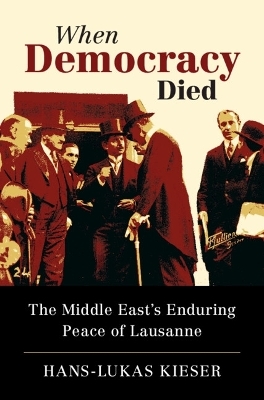
When Democracy Died
The Middle East's Enduring Peace of Lausanne
Seiten
2023
Cambridge University Press (Verlag)
978-1-316-51642-3 (ISBN)
Cambridge University Press (Verlag)
978-1-316-51642-3 (ISBN)
In an innovative, comprehensive account of the Lausanne Conference, Hans-Lukas Kieser recounts how the Conference concluded more than ten years of war and genocide in the late Ottoman Empire and explores the Treaty of Lausanne's resounding impact in the Middle East. Kieser shows how the Treaty excluded minority groups and shaped modern states.
The Treaty of Lausanne, signed in Switzerland in July 1923, officially settled the conflict between the Ottoman Empire and the Allied forces. Not only did the Treaty establish the borders of the modern Turkish republic, but it also defined boundaries, political systems, and understandings of citizenship in the newly formed post-Ottoman nation-states. Here, Hans-Lukas Kieser recounts how the eight dramatic months of the Lausanne Conference concluded more than ten years of war and genocide in the late Ottoman Empire. Crucially, the Treaty was in favour of a homogeneous Turkish state in Asia Minor and became the basis for the compulsory 'unmixing of people' that facilitated the persecution of minority groups, including Armenians, Kurds, and Arabs. Not only did this significant yet oft-overlooked treaty mark the end of the League of Nations' project of self-determination and security for small peoples, but it was crucial in shaping the modern Middle East, and dictatorships in Turkey and Europe.
The Treaty of Lausanne, signed in Switzerland in July 1923, officially settled the conflict between the Ottoman Empire and the Allied forces. Not only did the Treaty establish the borders of the modern Turkish republic, but it also defined boundaries, political systems, and understandings of citizenship in the newly formed post-Ottoman nation-states. Here, Hans-Lukas Kieser recounts how the eight dramatic months of the Lausanne Conference concluded more than ten years of war and genocide in the late Ottoman Empire. Crucially, the Treaty was in favour of a homogeneous Turkish state in Asia Minor and became the basis for the compulsory 'unmixing of people' that facilitated the persecution of minority groups, including Armenians, Kurds, and Arabs. Not only did this significant yet oft-overlooked treaty mark the end of the League of Nations' project of self-determination and security for small peoples, but it was crucial in shaping the modern Middle East, and dictatorships in Turkey and Europe.
Hans-Lukas Kieser is Associate Professor at the University of Newcastle, Australia, and Adjunct Professor at the University of Zurich. His books include Talât Pasha (2018), Nearest East (2010) and the edited volume Remembering the Great War in the Middle East (2022).
Introduction. The historic near east peace of Lausanne; 1. A century's pivotal 'peace'; 2. Against the Paris-Geneva peace: Bolsheviks, Turkists, Islamists; 3. A protracted conference: redefining Turkey, western realpolitik.
| Erscheinungsdatum | 03.04.2023 |
|---|---|
| Zusatzinfo | Worked examples or Exercises |
| Verlagsort | Cambridge |
| Sprache | englisch |
| Maße | 159 x 235 mm |
| Gewicht | 630 g |
| Themenwelt | Geisteswissenschaften ► Geschichte ► Regional- / Ländergeschichte |
| Sozialwissenschaften ► Politik / Verwaltung ► Europäische / Internationale Politik | |
| Sozialwissenschaften ► Politik / Verwaltung ► Staat / Verwaltung | |
| ISBN-10 | 1-316-51642-3 / 1316516423 |
| ISBN-13 | 978-1-316-51642-3 / 9781316516423 |
| Zustand | Neuware |
| Informationen gemäß Produktsicherheitsverordnung (GPSR) | |
| Haben Sie eine Frage zum Produkt? |
Mehr entdecken
aus dem Bereich
aus dem Bereich
Erinnerungen
Buch | Softcover (2024)
Pantheon (Verlag)
16,00 €


